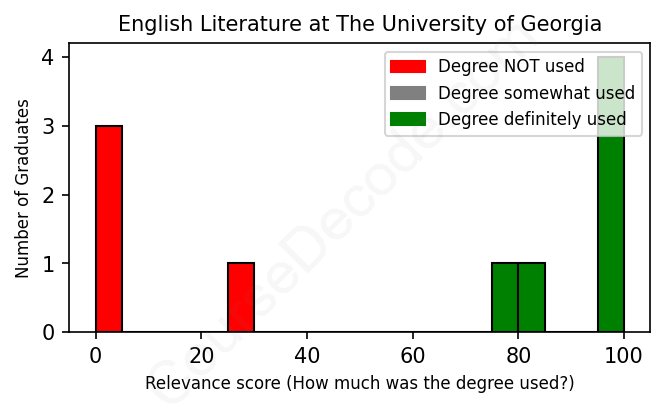
First, some facts. Of the English Literature graduates from The University of Georgia we've analyzed , here's how many have used (or NOT used) their degree in their career:

These are estimates based on AI analysis of 10 LinkedIn profiles (see below).
The verdict? Below average. Overall, with an average relevance score of 58%, English Literature graduates from The University of Georgia have a lower likelihood (-9%) of finding work in this field compared to the average graduate across all fields:
And for comparison, here's the chart for all profiles we've looked at across all degrees.
Also, after graduating, 50% of these graduates have pursued further education other than another Bachelor's degree (such as a Masters degree or other), compared to the average across all profiles of 35%. This suggests you may need more than just a Bachelors degree to be competitive as a English Literature graduate.
See the details:
|
Relevance score: 28% We think this person has NOT gone into a career related to their degree. We think this person has NOT gone into a career related to their degree.
DEGREE INFOGraduated in 2019 from The University of Georgia with a Bachelor's degree in English Literature. No other secondary education since. JOB HISTORY SINCE GRADUATIONContributor Stillpoint Literary Magazine Mar 2019 - Mar 2019 College Writing and Composition Tutor  N/A Jun 2019 - Aug 2019 Paralegal Assistant  Berryman Family Law Jun 2019 - Aug 2019 Bartender  9d's Bar Sep 2019 - Mar 2020 General Manager  Sips Espresso Cafe Aug 2020 - Apr 2022 Tattoo Shop Manager  Happy Ending Tattoo Apr 2022 - Aug 2023 ABOUTCarbonating words with a mouth full of Red Hots. I used to hate cinnamon and soda. |
The top 10 most common jobs done by the graduates we've analyzed (ranked most common to least) are:
From analyzing the job profiles of graduates with a degree in English Literature from The University of Georgia, it’s clear that there are a few common career paths that stand out. A significant number of graduates have ventured into retail and management roles, like Store Managers or Branch Managers, where the main focus is on business operations rather than the literary skills they acquired during their studies. These positions, such as those at Follett Higher Education or various distribution companies, generally lack direct relevance to English Literature, involving skills more aligned with business management than with reading, writing, or literary analysis.
On the flip side, there are also graduates who have found highly relevant positions that utilize their skills in English Literature. Many have taken on roles like Copywriters, English Teachers, and instructors in educational settings, where they can engage with literature, writing, and teaching. For instance, graduates working as copywriters at agencies or as English teachers clearly connect their jobs to their academic training. Overall, while many have ended up in roles that are tangential to their degree, there are notable exceptions where alumni have successfully leveraged their English Literature background in their careers, particularly in writing and education. It's a mixed bag, but it shows that an English Literature degree can lead to various pathways, both relevant and otherwise.
Here is a visual representation of the most common words in job titles for English Literature graduates (this is across all English Literature graduates we've analyzed, not just those who went to The University of Georgia):

Grads from The University of Georgia with a degree in English Literature seem to have a pretty mixed bag of career paths. Right after graduation, many find themselves in positions that don’t immediately scream "English Lit" but still utilize their communication skills. For instance, roles like store manager or teaching fellows appear quite common. It’s evident that some jump into education, like teaching positions at schools, while others take up jobs in editorial or management settings. There’s definitely a trend for the initial jobs not being directly linked to literary careers, which is something to think about if you’re considering this major.
When you look a bit further down the road—think 5 to 10 years post-graduation—there’s a noticeable shift for some. A few graduates do find their niche in writing or education, taking on roles such as copywriters or professors at various universities, which shows a commitment to the field and a progression in more literary-oriented careers. However, others still end up in roles that could feel far removed from an English Lit background, like management positions or other corporate jobs. So, it’s a bit of a mixed picture: some folks thrive in their literary paths while others veer off into various industries. Overall, it highlights the versatility of the English degree, but it also emphasizes that you might need to explore different fields before landing on that dream job directly related to your studies.
Getting a Bachelor’s degree in English Literature at The University of Georgia, or really at most universities, can be pretty challenging, but it really depends on your interests and strengths. If you love reading, analyzing texts, and writing about different themes and styles, you might find it enjoyable and maybe a bit easier. There’s a fair amount of reading involved, plus writing essays and participating in discussions about complex topics. However, if you're not as into literature or struggle with heavy reading loads, it could feel tougher. Overall, it's not the easiest degree out there, but it’s absolutely manageable if you’re passionate about the subject!
Most commonly, in the LinkedIn profiles we've looked at, it takes people 4 years to finish a Bachelor degree in English Literature.
Looking at these English Lit grads from UGA, it seems like they've had a pretty mixed bag in terms of their earning potential. The folks who went into management roles, like the Store Manager at Follett or the Branch Manager positions, likely made decent salaries, especially as they climbed the ladder. On the other hand, those in teaching or writing roles might not be raking in the big bucks, especially considering the typical pay for entry-level jobs or adjunct positions in academia. Freelance writing can be hit or miss—some might make a good income, while others might struggle. Overall, it looks like some have managed to score relatively well, while others are just getting by, so it really depends on the path they've taken since graduating.
Here is a visual representation of the most common words seen in the "about" section of LinkedIn profiles who have a Bachelor degree in English Literature (this is across all English Literature graduates we've analyzed, not just those who went to The University of Georgia). This may or may not be useful:

Here are all colleges offering a Bachelor degree in English Literature (ordered by the average relevance score of their English Literature graduates, best to worst) where we have analyzed at least 10 of their graduates: